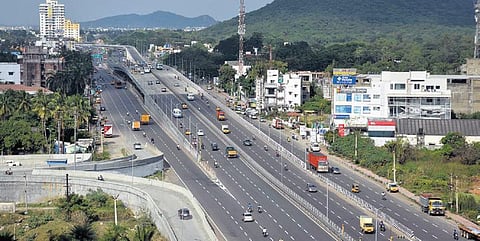

NEW DELHI: Streetlights along the entire network of National Highways (NHs), capping commercial vehicle drivers’ working hours to 10 hours a day, CCTV cameras at accident-prone sites, hefty penalties on overloaded vehicles and cattle owners whose animals stray onto the highways are among the key recommendations made by the Parliamentary Standing Committee on transport, tourism and culture to ensure the safety of road users.
The panel has also suggested the installation of CCTV cameras at every few kilometres at road development projects sites, even if they are at the construction stage, for close monitoring of progress.
In its report submitted last month, the committee said installing CCTV cameras will permit round-the-clock ground-level monitoring of the progress being made in ongoing road projects and also deter wrongdoers.
“The CCTV cameras thus installed can be made a part of the fully constructed road once the project gets completed and can be used to monitor traffic movements, accidents,” reads the report.
CCTV cameras may also be installed at accident-prone sites, black spots which are yet to be rectified and other important locations on the NHs to monitor road accidents and arrange urgent medical help, the panel says, adding that drones also may be utilised for regulating vehicle movement.
The Ministry of Road Transport and Highways may come up with provisions to make it mandatory to install streetlights on the entire NH network “since poor lighting conditions lead to severe accidents. Regular maintenance of the streetlights may be ensured in coordination with agencies concerned,” the panel states.
Key recommendations
Action/penalty on cattle or animal-rearers for letting out their animals on NHs.
Hefty fines on consignor and consignee for vehicles not abiding by the weight carrying limits.
Provisions to charge toll tax on the basis of weight of the vehicles instead of axle-based toll collection.
Priority to maintenance and repair of NHs with substantially higher budgetary allocation.
Selection of construction materials by factoring in durability.
Food joints, restrooms, toilets and other amenities alongside NHs to reduce the menace of illegal parking and to avoid accidents.
Still a long way to go
At the time of Independence, total road length in the country was 3,88,226 km.
At present, India has the second largest road network in the world of about 63.72 lakh km. comprising national highways (NHs), expressways, state highways, major district roads, and village roads.
Length of NHs as per the Annual Report (2021-22) of MoRTH is 1,40,995 km.
Of India’s total road network, almost 40% is unpaved.
National Highways constitute less than 3% of the total road network.
India accounts for 11% of global deaths in road accidents while having only 1% of the world’s vehicles.
40% of villages have no access to all-weather roads.
In 2020, the total recorded road accidents in India were 3,66,138.
(Source: Parliamentary Standing Committee report on transport, tourism and culture)